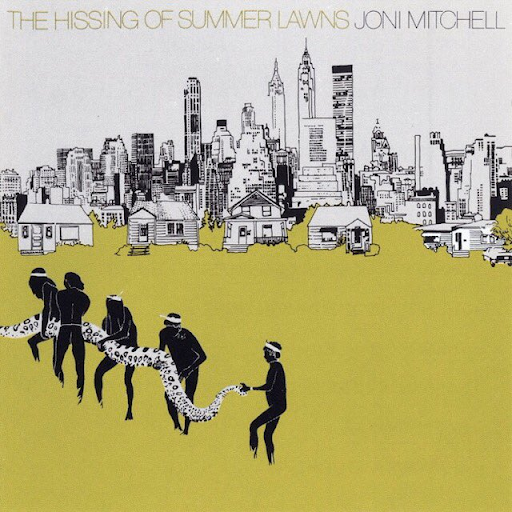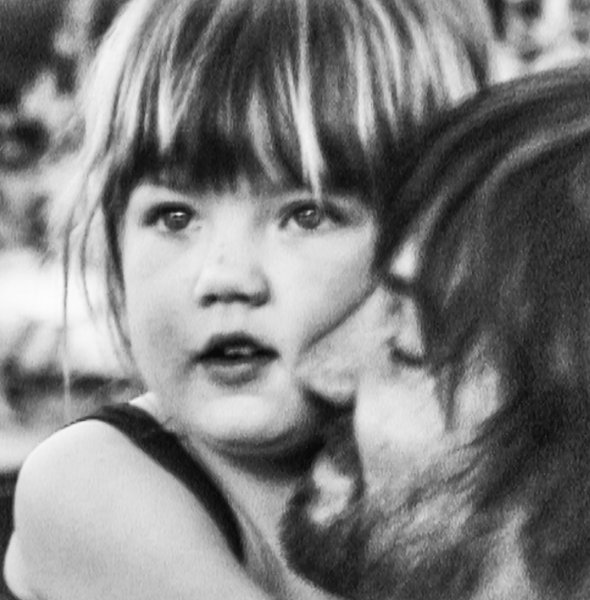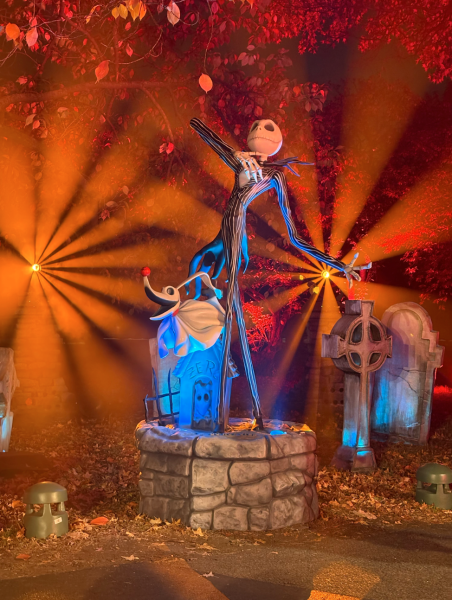“The Hissing of Summer Lawns” is a Window Into the Past

“The Hissing of Summer Lawns,” Joni Mitchell’s 1975 feminist critique, provides a window into the past. (Courtesy of Twitter)
I first heard Joni Mitchell’s 1975 album “The Hissing of Summer Lawns” on my back patio on a blistering July afternoon. It was the album’s 45th anniversary in 2020, so I had decided to listen. The Texas sun beat down as I made my way through an album that, at first glance, was cool in every sense of the word — the instrumentals acoustic and unobtrusive, Mitchell’s voice trickling like water over subtle rhythms and percussion.
“He bought her a diamond for her throat / He put her in a ranch house on a hill / She could see the valley barbecues / From her window sill / She could see the blue pools in the squinting sun / Hear the hissing of summer lawns”
These are the opening lines from the eponymous title track, a song about a suburban married couple whose lives initially seem luxurious and peaceful. They set the tone for the album as a whole: lyrics imagery-rich, descriptive, but otherwise ambiguous — at first glance, perhaps unremarkable. Yet, as with all of the renowned Canadian musician’s work, there is more to the words than meet the eye.
For example, Mitchell notes that the husband buys jewelry not for his wife as much as for her throat; instead of buying her a necklace for her to wear, he purchases an expensive statement for her to display. He “puts” her, like one would place furniture, in a ranch house (which screams seclusion). From the windowsill, she stares out at the lives of suburban neighbors — whether in longing or caution we do not quite know — and takes in the sounds. She hears “the hissing of summer lawns.”
What is the “hissing” of summer lawns? The realization struck me that July afternoon in a way it might not have if I wasn’t outside of my suburban home. Superficially, the hissing refers to the sound a sprinkler makes. If you listen closer, you’ll realize the “hissing” represents the sinister influences that linger in seemingly domestic and tranquil communities (notice too the snake on the album’s cover). It represents the evil and ugly truths that lie beneath societal norms, awaiting chances to explode and disrupt the calm, urbane lifestyles we lead.
This dark undercurrent flows through the entirety of the album. It’s a piece of work that reflects on problems “developed” societies try to mask (and the problems we pretend don’t really exist) — the most prominent of which is the subjugation of women. The last stanza of the title track explains, “He gave her his darkness to regret / And good reason to quit him.” Despite obvious examples of emotional and psychological abuse peppering the rest of the song, the narrator sings these lines with sarcasm and disappointment — she knows how the story ends: “Still she stays with a love of some kind / It’s the lady’s choice / The hissing of summer lawns.”
Despite having become famous in the confessional singer-songwriter scene of the early ’70s, Mitchell chose to continue exploring territory with “Hissing.” The album is a stark and cerebral social commentary — contrary to her most popular work (albums like “Song to a Seagull” and “Blue”). In lieu of her prior sentimental work, which saw her earnestly showcase the happy-sad emotional rollercoaster of relationships, Mitchell chose to pull back from the lyrical hand holding. In “Hissing,” emotions are not simply good or bad, and people do not simply love or despair. The emotional states of this album are ambiguous, twisted, subtle, shifting. Pitchfork sums it up best: “the characters that inhabit ‘Hissing,’ mostly women, are strangers to their innermost feelings, or struggling to become so in order to escape or cope.”
When I first realized that the album, in all of its smooth, jazz-inspired folk instrumentation, held such gut-punching layers, it was a shock. The songs are meditative and deeply atmospheric. The guitars reverberate above your head, the bass lines swirl below. The soft sounds of “Hissing” betray the murkiness of their accompanying lyrics, the biting and beautiful second wave feminist poetry. This is, of course, the point: Mitchell fashioned the sonic elements of the songs as meticulously as she wrote the words, and crafted both to lull the listener into the same false sense of security that deceives the songs’ subjects.
That darkness is evident in every glistening track. In “Edith and the Kingpin,” a drug lord keeps his molls leashed to his side through narcotics. Mitchell describes them: “Women he has taken grow old too soon / He tilts their tired faces / gently to the spoon.” In “Harry’s House / Centerpiece,” a businessman gazes out of a hotel’s continental suite, reminiscing about the way his wife looked before their marriage: “He drifts off into the memory of how she looked in school / With her body oiled and shining / At the public swimming pool” (in other words, a catch). Meanwhile, the wife chooses “yellow checkers for the kitchen / She is lost in House and Garden.” In “Don’t Interrupt the Sorrow,” a husband lambasts a wife for speaking up: “He says, ‘we walked on the moon / you be polite.’” And in “The Hissing of Summer Lawns,” “there’s a heatwave burning / in her master’s voice.”
In each song, the characters don’t fully realize the roles they fill. The men punch down obliviously; the women retreat, convincing themselves that all is well. Mitchell sardonically refers to the men as “paper-minded … masters,” two-dimensional proponents of toxic masculinity; she confidently refers to the women as “prophet witches,” burned at the stake for speaking their truths.
Mitchell writes of this clearly and artfully, as her career can attest. As folk singer John Sieger writes, that anyone can describe a “woman’s point of view so clearly and sympathetically, in a way the average thick-headed man can relate to, is rare.” The women in her songs embody the standard relationships Mitchell grew up seeing, and witnessed even as she wrote the album.
In fact, they embody the relationships we see today. In the era of #MeToo and long-overdue advancements in women’s rights, looking back at this oft-forgotten album provides a looking glass into the past. The sorrow has always been here, and will likely persist for years. And while “The Hissing of Summer Lawns” helps us track our progress, it warns us that some “heat waves” are hidden in plain sight.

Hanif Amanullah is a junior from Austin, Tex., majoring in international studies, whose passion for news writing and multimedia led him to the Ram. Hanif...












































































































































































































